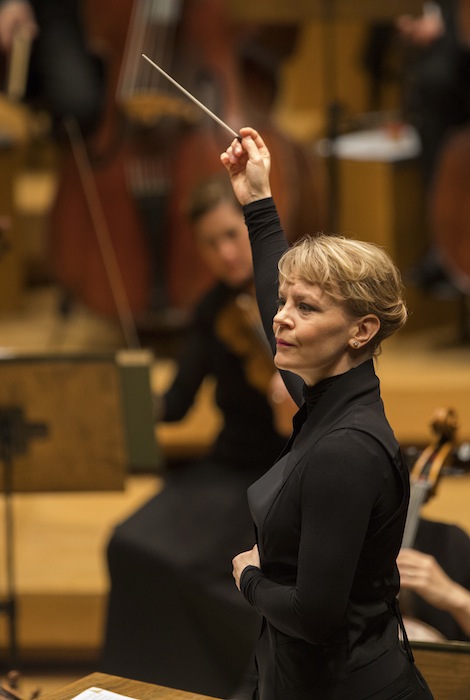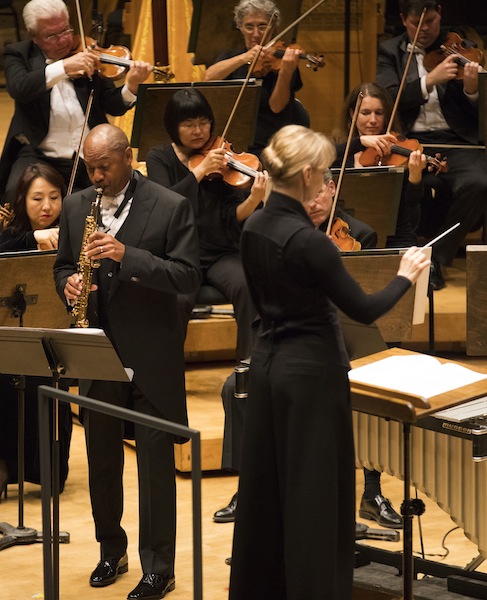Mälkki and the CSO serve up a powerful world premiere

The Chicago Symphony Orchestra’s penultimate program of this season is a decidedly offbeat potpourri: a world premiere, a pair of French cornerstones, and a saxophone soloist equally at home in the realms of jazz and classical music.
If not everything worked equally well Thursday night, the results were largely successful with Susanna Mälkki, one of the CSO’s most reliable guest conductors, in charge on the podium.
The main order of business was the debut of Melinda Wagner’s Proceed, Moon, the orchestra’s fourth and final commissioned premiere of this season.
Wagner, a protege of Shulamit Ran when a student at the University of Chicago, has enjoyed two previous CSO world premieres of her music: Falling Angels in 1992 and her piano concerto Extremity of Sky in 2003. She won the 1999 Pulitzer Prize in music for her Concerto for Flute, Strings and Percussion.
The title of Proceed, Moon is a quote from A Midsummer Night’s Dream, but the work has no specific programmatic or Shakespeare inspiration. Rather, says Wagner, it is a “free unfolding of ideas” (the subtitle is “Fantasy for Orchestra”).
Proceed, Moon is scored for massive forces, including, harp, piano, celesta and four percussionists whose Brobdingnagian arsenal includes xylophone, crotales, maraca, and multiple triangles, as well as such exotica as wind gong, wrist and ankle bells and “glass wind chimes with small fan.”
The score commences with a quick, upward flourish, followed by a passage of tense, luminous mystery. Three trumpets play a fanfare-like theme and the restless, roiling music works its way into an ardent, shimmering climax. A high-flying clarinet solo—well played by John Bruce Yeh–leads into more agitated and turbulent music. The music eventually quietens into a delicate, pointillist passage for piano and high percussion introducing a recording of a children’s choir singing Handel’s “Where E’er You Walk.” The stormy music returns and the music reaches a loud rumbling tumult before the volume and instrumentation slowly thin out and descend as the work closes on a refined and glowing coda.
There are two issues with Proceed, Moon. At 18 minutes, Wagner’s work feels about five minutes too long and would be more effective with a little judicious pruning. Secondly, whatever the personal significance, the children’s choir sampling is jarring and doesn’t cohere with the music surrounding it, feeling decidedly twee.
Those apart, Proceed Moon is a strong, audacious and compelling work. It was an inspired idea to have Mälkki–who built her reputation with IRCAM as a contemporary music specialist–entrusted with this premiere. The Finnish conductor is inspired at deconstructing challenging modern scores and Mälkki drew a bracing and powerful performance from the responsive CSO musicians. Wagner’s colors and effects came through boldly with impressive clarity and transparency even in the most uninhibited sections. The American composer was applauded politely Thursday night; both the music and the performance deserved a better response.
Among the world’s most celebrated saxophonists, Branford Marsalis straddles the jazz and classical genres with enviable style and ease, as shown in his brief 19-minute appearance as the evening’s soloist.
Gabriel Faure’s indestructible Pavane has lent itself to a number of concertante arrangements, not least Bobby McFerrin’s vocalized version. Playing a soprano saxophone, Marsalis floated the theme with cool fluency but the music seemed to call for a more rapt and intimate response.
The soloist was heard to better advantage in John Williams’ Escapades from the film Catch Me If You Can. Steven Spielberg’s 2002 film related the true story of Frank Abagnale, a 1960s scam artist turned FBI and bank security consultant.
Williams’ engaging score for the film is one of his best and most subtle, steeped in the progressive jazz of the period. Drawing from that score, Escapades, a 13-minute mini-concerto for alto saxophone, made a fine vehicle for Marsalis, whose nimble articulation and cool-jazz style fit Williams’s music like a well-tailored glove.
In the central movement (“Reflections”) Marsalis’s sinuous phrasing and dynamics fully evoked the moody urban meditation, which grows into an ardent–but not over-the-top–lyric outpouring. The final section, “Joy Ride,” is based on a typical Williams-esque broad and striding theme, and offers the most bravura opportunities, all surmounted by Marsalis with understated facility and panache.
At times Escapades morphs into a triple concerto with equally prominent roles for vibraphone and amplified double-bass. Joining Marsalis at the front of the stage, CSO members Cynthia Yeh and Robert Kassenger made a companionable jazz club trio in their spotlighted moments. Yeh was just as impressive as Marsalis, keeping pace with the saxophonist’s fast tempos with some stunning vibraphone virtuosity. Mälkki was a sympathetic partner, skillfully handling the rapid-fire alternation of soloists and orchestra in the final movement
A pair of French cornerstones framed the evening.
Bizet’s Symphony in C—same key as the Wagner premiere–is a student work but so tuneful and winningly crafted that it immediately won a place in the repertoire after being lost for seven decades. Malkki led a vigorous performance, though the beefy textures and nervous urgency somewhat slighted the score’s piquant Gallic charm. The crackling tempo for the finale was more Prestissimo than Allegro vivace but watching the CSO violins articulate the main theme with unruffled command at warp speed was undeniably entertaining.
Debussy’s Iberia closed the evening. As in the Bizet, there were a couple unkempt entrances and here a not-together final chord that indicated the CSO musicians are still getting accustomed to Mälkki’s flowing baton style. (Inevitably, preparing the Wagner premiere likely left little time for polishing the rest of the program.)
While the central section could have been more hushed in its nocturnal atmosphere, Mälkki led a worthy performance that brought out the brilliance and ingenuity of Debussy’s Spanish triptych.
The program will be repeated 8 p.m. Friday and Saturday. cso.org; 312-294-3000.
Posted in Performances






Posted Jun 16, 2017 at 8:13 pm by Andrew
I’m not saying I don’t like many of the pieces that the CSO has performed in the last month or so, but why does the programming at the end of this season have a certain “grab bag” quality?